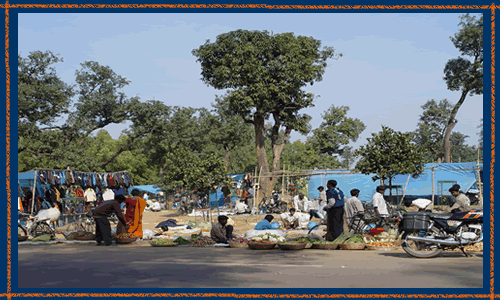|
The
smell of fresh mahua,
the fuss over pricey pototaoes

The more the people, the more varied their wares
and their stories. Out of sacks and plastic bags tumble potatoes, onions, radish,
carrots, tomatoes, cabbages and by 10 in the morning the place is a riot of colours
- red chillies, purple eggplants, green cabbages, freshly washed white radish,
all pitted against mounds of potatoes wearing brown jackets and onions in red
layered dresses.
The
smell of moist mahua and fresh fish hover in the air, the fuss over the price
of potato is deafened by the shriek of a woman startled by a stray dog. Bright
striped underwears hang next to garish pink ribbons, terracotta pots and neatly
woven sieves converse like friendly neighbours, while an already inebriated old
man pleads for another bottle of handiya, the rice beer that can knock off your
onions for less than 10 rupees. In a corner a woman sits alone with just a handful
of chillies, on the other, a bearded, craggy man hawks bones, herbs, and potions
for utmost sexual pleasure. His confidence can be contagious, though his wares
can impair even the believers. The more the people,
the more varied their wares and their stories. Every Wednesday and Saturday, farmers
and small traders from neighbouring villages swarm to Morabadi Maidan in Ranchi
to sell what they either grow in their gardens or can buy from the wholesale market.
The place starts buzzing with activity very early when men and women spread plastic
sheets to mark their territory for the day. A place under a tree is the most prized
spot, while being relegated to a corner means bad business. Out of sacks and plastic
bags tumble potatoes, onions, radish, carrots, tomatoes, cabbages and by 10 in
the morning the place is a riot of colours - red chillies, purple eggplants, green
cabbages, freshly washed white radish, all pitted against mounds of potatoes wearing
brown jackets and onions in red layered dresses. Was
I looking from the ivory tower into the world below? Perhaps. How else would I
have known the story of 70-year old Sadan Devi, who still bawls for her husband
who died 50 years ago and curses her Fate for having borne such ungrateful sons.
She comes to the market because she has to fend for herself. She needs money and
asks me brazenly whether I could take her home; she promises to tend to my garden
and take care of household chores, all she wants in return is a life of respect.
It is a little respect and some extra moolah
that they all crave for. Sunaina Devi studied till class VIII but poverty and
marriage drove her to selling vegetables in a market. She has nothing else to
do for five days a week and tells me I should write about their plight so that
the government could sit up and notice. I coax
Parvati into sharing the handiya-making recipe; she goads me to drink rice beer,
she promises it would keep my stomach cool and my health peachy. She also propounds
the virtues of rice beer and why it should be the nation's staple drink. It
is women who rule the roost in the haat, both as buyers and sellers. Most men
are mere standbys, they strut around aimlessly; at their best they serve as appendages
to their women folk. Haggling is the order
of the day, be it for a rupee or a penny. Every penny is jealously guarded and
tucked away in stringed cloth purses. The purses itself are kept in a vault -
inside the blouse or beneath the petticoat and are pulled out with amazing agility.
Most have lunch in the haat itself; tea can be had for Rs 1 for a tiny glass,
and lunch for as little as Rs 5. There's enough variety to choose from - fried
fish, rice and dal, potato curry, gulgulas, pakoras, jalebis and puffed puris.
These stories are enacted not just in Morabadi
Maidan, on every street and every fair ground in Ranchi you would find a Sadan
Devi hunched on a plastic sheet, quibbling over the price of tomatoes and waiting
for Godot.
Just as the sun starts walking down the elm, most of the sellers
in the market start packing up too. The unwanted potatoes go back into the sacks,
dust is shrugged off the underwears and frocks and shoved into large bags, inebriated
men swagger and scream, the plastic sheets are folded and the candles and lamps
are snuffed out. Sadan Devi, Parvati and others walk home or get packed like sardines
in autorickshaws. Not much waits for them at home. Tomorrow,
for them, is always a distant dream. Cliched, but replete with hope.
Published
in Discover India magazine, March 2004. |

